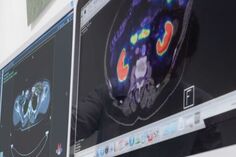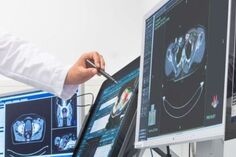Sarkome und Chordome
Da Sarkome und Chordome eine relativ geringe Inzidenz aufweisen und zusätzlich noch eine sehr heterogene Gruppe mit vielen unterschiedlichen Merkmalen darstellen, sind Therapie und Forschung in Deutschland auf einige wenige Zentren mit hoher Expertise beschränkt.
Die Arbeitsgruppe Sarkome und Chordome der Radioonkologie Heidelberg erarbeitet im interdisziplinären Kontext mit den Kollegen aus Orthopädie, Chirurgie, Internistischer Onkologie (NCT), diagnostischer Radiologie und Pathologie Strategien für eine optimale Therapie mit hocheffektiver Wirkung und minimaler Nebenwirkung.
In Heidelberg stehen uns mit dem Heidelberger Ionenstrahltherapiezentrum (HIT) die einzigartige Möglichkeit einer Protonen- und Kohlenstoffionenbestrahlung zur Behandlung von Sarkomen und Chordomen mit zur Verfügung. Hierbei wird der klinische Stellenwert dieser Therapie in 2 randomisierten Phase III Studien und 3 randomisierten Phase II Studien für Chordome und Sarkome evaluiert. Zusätzlich steht eine Intraoperative Therapie mit Elektronen zur Dosiseskalation und maximalen Schonung von Normalgewebe zur Verfügung, welche in Kooperation mit der Chirurgie und Orthopädie erfolgt. Neben modernen Linearbeschleunigern zur neoadjuvanten und adjuvanten Therapie der Sarkome sind MR-geführte Strahlentherapie und Cyberknife zur ablativen Therapie möglicher Metastasen vor Ort.
Zur strahlentherapeutischen Optimierung werden nicht nur klinische und technische Parameter der Therapie, sondern auch molekulargenetische Parameter des individuellen Tumorgewebes untersucht, um die Biologie der Sarkome und Chordome besser zu verstehen und neue Strategien für effektivere Therapieansätze zu entwickeln.
Radioonkologische Studien
- ISAC –CHORDOM-STUDIE (rekrutiert, prospektiv randomisiert Phase II)
Bestrahlung sacrococygealer Chordome mittels Ionen (Protonen vs. Kohlenstoffionen) - HIT-1-CHORDOM-STUDIE (rekrutiert, prospektiv randomisiert Phase III)
Bestrahlung von Schädelbasischordomen mittels Ionen (Protonen vs. Kohlenstoffionen) - CS.pP.12C. CHONDROSARKOM-STUDIE (rekrutiert, prospektiv randomisiert Phase III)Bestrahlung von Schädelbasischondrosarkomen mittels Ionen (Protonen vs. Kohlenstoffionen)
- RETRO-ION-STUDIE (rekrutiert, prospektiv randomisiert Phase II)
Neoadjuvante Bestrahlung retroperitonealer Sarkome mittels Ionen (Protonen vs. Kohlenstoffionen) - EXTREM-ION-STUDIE (in Vorbereitung, prospektiv randomisiert Phase II)
Neoadjuvante Bestrahlung von Extremitätensarkomen mittels Ionen (Protonen vs. Kohlenstoffionen) - OSCAR-STUDIE (geschlossen, publiziert)
Bestrahlung von nicht resezierten Osteosarkomen mittels Ionen
Mitarbeiter
Publikationen
1. Uhl M, Sterzing F, Habl G, Schubert K, Sroka-Perez G, Debus J, Herfarth K.
CT-myelography for high-dose irradiation of spinal and paraspinal tumors with helical tomotherapy: revival of an old tool.
Strahlenther Onkol. 2011; 187: 416-20.
2. Uhl M, Mattke M, Welzel T, Oelmann J, Habl G, Jensen AD, Ellerbrock M, Haberer T, Herfarth KK, Debus J.
High control rate in patients with chondrosarcoma of the skull base after carbon ion therapy: First report of long-term results.
Cancer. 2014; 120: 1579-85.
3. Uhl M, Mattke M, Welzel T, Roeder F, Oelmann J, Habl G, Jensen A, Ellerbrock M, Jäkel O, Haberer T, Herfarth K, Debus J.
Highly effective treatment of skull base chordoma with carbon ion irradiation using a raster scan technique in 155 patients: first long-term results.
Cancer. 2014; 120: 3410-7.
4. Uhl M, Welzel T, Oelmann J, Habl G, Hauswald H, Jensen A, Ellerbrock M, Debus J, Herfarth K.
Active raster scanning with carbon ions: Reirradiation in patients with recurrent skull base chordomas and chondrosarcomas
Strahlenther Onkol. 2014; 190: 686-91.
5. Uhl M, Edler L, Jensen AD, Habl G, Oelmann J, Röder F, Jäckel O, Debus J, Herfarth K
Randomized phase II trial of hypofractionated proton versus carbon ion radiation therapy in patients with sacrococcygeal chordoma-the ISAC trial protocol
Radiat Oncol. 2014; 9: 100.
6. Roeder F, Ulrich A, Habl G, Uhl M, Saleh-Ebrahimi L, Huber PE, Schulz-Ertner D, Nikoghosyan AV, Alldinger I, Krempien R, Mechtersheimer G, Hensley FW, Debus J, Bischof M.
Clinical phase I/II trial to investigate preoperative dose-escalated intensity-modulated radiation therapy (IMRT) and intraoperative radiation therapy (IORT) in patients with retroperitoneal soft tissue sarcoma: interim analysis.
BMC Cancer. 2014; 14: 617.
7. Uhl M, Herfarth K, Debus J
Comparing the use of protons and carbon ions for treatment
Cancer J. 2014; 6: 433-9.
8. Uhl M, Debus J
Chordoma: an assessment of future treatment and management strategies
Expert Opinion On Orphan Drugs. 2014; 2: 557-565.
9. Uhl M, Welzel T, Jensen A, Ellerbrock M, Haberer T, Jäkel O, Herfarth K, Debus J.
Carbon ion beam treatment in patients with primary and recurrent sacrococcygeal chordoma.
Strahlenther Onkol. 2015;191:597-603.
10. Jensen AD, Uhl M, Chaudhri N, Herfarth KK, Debus J, Roeder F.
Carbon Ion irradiation in the treatment of grossly incomplete or unresectable malignant peripheral nerve sheaths tumors: acute toxicity and preliminary outcome.
Radiat Oncol. 2015; 10: 109.
11. Stacchiotti S, Sommer J; on behalf of a Chordoma global consensus group.
Building a global consensus approach to chordoma: a position paper from the medical and patient
community
Lancet Oncol. 2015; 16: 71190-8.
12. Roeder F, Lehner B, Saleh-Ebrahimi L, Hensley FW, Ulrich A, Alldinger I, Mechtersheimer G, Huber PE, Krempien R, Bischof M, Debus J, Uhl M.
Intraoperative electron radiation therapy combined with external beam radiation therapy and limb sparing surgery in extremity soft tissue sarcoma: a retrospective single center analysis of 183 cases.
Radiother Oncol. 2016;119:22-9.
13. Stacchiotti S, Gronchi A, Fossati P, Akiyama T, Alapetite C, Baumann M, Blay JY, Bolle S, Boriani S, Bruzzi P, Capanna R, Caraceni A, Casadei R, Colia V, Debus J, Delaney T, Desai A, Dileo P, Dijkstra S, Doglietto F, Flanagan A, Froelich S, Gardner PA, Gelderblom H, Gokaslan ZL, Haas R, Heery C, Hindi N, Hohenberger P, Hornicek F, Imai R, Jeys L, Jones RL, Kasper B, Kawai A, Krengli M, Leithner A, Logowska I, Martin Broto J, Mazzatenta D, Morosi C, Nicolai P, Norum OJ, Patel S, Penel N, Picci P, Pilotti S, Radaelli S, Ricchini F, Rutkowski P, Scheipl S, Sen C, Tamborini E, Thornton KA, Timmermann B, Torri V, Tunn PU, Uhl M, Yamada Y, Weber DC, Vanel D, Varga PP, Vleggeert-Lankamp CLA, Casali PG, Sommer J.
Best practices for the management of local-regional recurrent chordoma: a position paper by the Chordoma Global Consensus Group.
Ann Oncol. 2017; 28:1230-1242.
14. Mattke M, Vogt K, Bougatf N, Welzel T, Oelmann-Avendano J, Hauswald H, Jensen A, Ellerbrock M, Jäkel O, Haberer T, Herfarth K, Debus J, Uhl M.
High control rates of proton- and carbon-ion-beam treatment with intensity-modulated active raster scanning in 101 patients with skull base chondrosarcoma at the Heidelberg Ion Beam Therapy Center.
Cancer. 2018;124:2036-2044.
15. Sprave T, Verma V, Sterzing F, Bruckner T, Hees K, Land B, Jäkel O, Herfarth K, Debus J, Uhl M.
Cost-Effectiveness of Carbon Ion Radiation Therapy for Skull Base Chordoma Utilizing Long-Term (10-Year) Outcome Data.
Anticancer Res. 2018; 38: 4853-4858.
16. Bostel T, Nicolay NH, Welzel T, Bruckner T, Mattke M, Akbaba S, Sprave T, Debus J, Uhl M.
Sacral insufficiency fractures after high-dose carbon-ion based radiotherapy of sacral chordomas.
Radiat Oncol. 2018; 13: 154.
17. Abouarab MH, Salem IL, Degheidy MM, Henn D, Hirche C, Eweida A, Uhl M, Kneser U, Kremer T.
Therapeutic options and postoperative wound complications after extremity soft tissue sarcoma resection and postoperative external beam radiotherapy.
Int Wound J. 2018;15:148-158.
18. Roeder F, Alldinger I, Uhl M, Saleh-Ebrahimi L, Schimmack S, Mechtersheimer G, Büchler MW, Debus J, Krempien R, Ulrich A.
Intraoperative Electron Radiation Therapy in Retroperitoneal Sarcoma.
Int J Radiat Oncol Biol Phys. 2018;100:516-527.
19. Welzel T, Meyerhof E, Uhl M, Huang K, von Deimling A, Herfarth K, Debus J. Diagnostic accuracy of DW MR imaging in the differentiation of chordomas and chondrosarcomas of the skull base: A 3.0-T MRI study of 105 cases.
Eur J Radiol. 2018;105:119-124.
20. Roeder F, de Paoli A, Saleh-Ebrahimi L, Alldinger I, Bertola G, Boz G, Navarria F, Cuervo M, Uhl M, Alvarez A, Buechler M, Lehner B, Debus J, Calvo FA, Krempien R.
Intraoperative Electron Radiation Therapy Combined with External Beam Radiation Therapy after Gross Total Resection in Extremity Soft Tissue Sarcoma: A European Pooled Analysis.
Ann Surg Oncol. 2018; 25:3833-3842.
21. Uhl M, Debus J. Heavy Ion Radiation for Chordomas and Chondrosarcomas In: Harsh IV GR, Vaz-Guimaraes F, eds., Chordomas and Chondrosarcomas of the Skull Base and Spine, Second Edition. San Diego: Academic Press, 2018:371-380.
22. Vogin G, Wambersie A, Koto M, Ohno T, Uhl M, Fossati P, Balosso J; ULICE WP2 working group.
A step towards international prospective trials in carbon ion radiotherapy: investigation of factors influencing dose distribution in the facilities in operation based on a case of skull base chordoma.
Radiat Oncol. 2019; 14: 24.
23. Seidensaal K, Harrabi SB, Uhl M, Debus J.
Re-irradiation with protons or heavy ions with focus on head and neck, skull base and brain malignancies.
Br J Radiol. 2020; 93: 20190516.
24.Willis F, Schimmack S, Uhl M, Haefner MF, Mechtersheimer G, Hinz U, Schmidt T, Debus J, Fröhling S, Schneider M.
Significance of intraoperative radiation therapy and high cumulative radiation doses in retroperitoneal soft tissue sarcoma.
Eur J Surg Oncol. 2019 Dec 17. pii: S0748-7983(19)31507-0. [Epub ahead of print]







